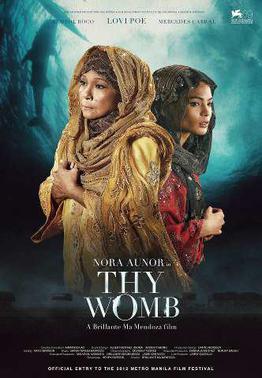Top Qs
Timeline
Chat
Perspective
Thy Womb
2012 Filipino film From Wikipedia, the free encyclopedia
Remove ads
Thy Womb (Filipino: Sinapupunan) is a 2012 Filipino drama film starring Nora Aunor, Bembol Roco, Mercedes Cabral, and Lovi Poe.[1] Produced by Center Stage Productions and the Film Development Council of the Philippines (FDCP), Melvin Mangada and Jaime Santiago, the film was written by Henry Burgos and directed by Brillante Mendoza. The film was one of the eight official entries to the 2012 Metro Manila Film Festival.
The film competed for the Golden Lion at the 69th Venice International Film Festival.[2] Although it did not bag the top honors, Thy Womb was awarded three special prizes by other Italian film groups — La Navicella Venezia Cinema Award, the P. Nazareno Taddei Award - Special Mention, and the Bisato d' Oro Award for Best Actress (for Nora Aunor) given by an independent Italian critics group called Premio Della Critica Indipendiente.[3] The film was also invited to the 37th Toronto International Film Festival and the 17th Busan International Film Festival.[4][5] Aunor's performance was universally acclaimed by local and foreign film critics.[6][7]
The film was referred to as "The Philippines' principal trophy" in Encyclopædia Britannica's section discussing the previous year's films in the Britannica Book of the Year 2013.[8]
Remove ads
Plot
Summarize
Perspective
Shaleha (Nora Aunor) and her husband, Bangas-An (Bembol Roco), are an elderly Tausug couple in a village in Tawi-Tawi. Shaleha is a village midwife and helps deliver a baby in a stilt hut. Bangas-An helps with the process. Once the baby is successfully delivered, Shaleha asks for the child’s umbilical cord. A storage cabinet of Shaleha shows several cords that she has requested in previous childbirths, showing that she has assisted in the delivery of many children in the community.
Later while weaving banig, Shaleha asks Bangas-An whether they should adopt a child, so they can have a child at home as Shaleha is not able to bear a child. Bangas-An hesitates, stating that the previous child they adopted was taken from them. It is not revealed how the child was taken, whether the child died or was taken by the biological parents. The idea of Bangas-An taking another wife is brought up, so that the new woman can bear a child for the home, since under Muslim law, men can take up to four wives, provided he can provide for her financially, and with the consent of the prior wife.
The presence of military and gunned men is a recurring theme. In a scene early in the movie, Shaleha and her husband are fishing in open water. They are able to have a bountiful catch but an encounter with gunned men leaves Bangas-An shot and their catch of fish are seized. Shaleha tends to her husbands wounds using folk medicine. In the scene with a floating market, Shaleha’s purchase of sweet potatoes are spilled on the ground as military men bump into her while running to an encounter. In a later scene, Shaleha and Bangas-An assist in a traditional wedding of a young couple, Aisha (Mercedes Cabral) and Nurjay. The wedding dance between bride and groom and disrupted with gunfire heard from a distance. Shaleha insists that the wedding dance continue. The newly-wed couple are disturbed but continue the traditional dance.
Shaleha starts the process of finding a suitable bride. While selling their dried fish products in a floating market, Shaleha asks a woman that they encounter whether she would like to be her husband’s second wife. The woman does not answer. In the floating market, Shaleha and her husband run errands separately while selling their dried fish products. Shaleha eyes a beautiful veil but does not purchase it, saying that it is too expensive. Upon her return to her boat, Bangas-An reveals that he has purchased a beautiful veil for her, similar to the one she was eyeing. The search for a suitable bride continues, with a planned rendezvous with a potential bride in the mosque spurred due to the potential bride no showing up. Shaleha rationalizes that it is better for her to be involved in the process, rather than for her husband to fool around on his own.
Later, a wedding negotiator informed Shaleha that he was able to find a willing bride for Bangas-An, but the bride was requesting a dowry of PHP150,000. Since the couple’s savings amounted to only PHP50,000, the couple resorted to seeking additional funds from associates for the dowry. The couple also sold the motor of their boat in order to complete the dowry. Having completed the dowry, the couple journey to the prospective bride’s residence together with village elders, to initiate the marriage proposal. During the proposal, the bride’s mother accepts the dowry presented, and compliments Shaleha for her strength of character. The prospective bride, Mersila (Lovi Poe), then asks to speak with Bangas-An alone. Mersila asks Bangas-An if he is fully aware of all the conditions of the dowry. It is revealed that Shaleha had agreed to Mersila’s condition that once she is able to produce a child for them, Bangas-An is to divorce Shaleha. Later at home, Bangas-An tearfully assists Shaleha in her weaving, acknowledging her sacrifice. The couple has sexual intercourse.
In the final scene, Shaleha assists in the birth of Mersila’s child with Bangas-An as midwife. It is revealed that she bore a son. Shaleha asks for the child’s umbilical cord, and Mersila agrees albeit in a dismissive manner. Shaleha cradles the child but Bangas-An impatiently asks for the child to be handed to Mersila as the mother. As Shaleha hands the child to Mersila, a large flock of birds fly across the horizon and surprises her.
Remove ads
Cast

- Nora Aunor as Shaleha
- Bembol Roco as Bangas-An
- Lovi Poe as Mersila
- Mercedes Cabral as Aisha
Citations and awards
Summarize
Perspective
International awards and recognition
Philippine awards
Remove ads
References
External links
Wikiwand - on
Seamless Wikipedia browsing. On steroids.
Remove ads

